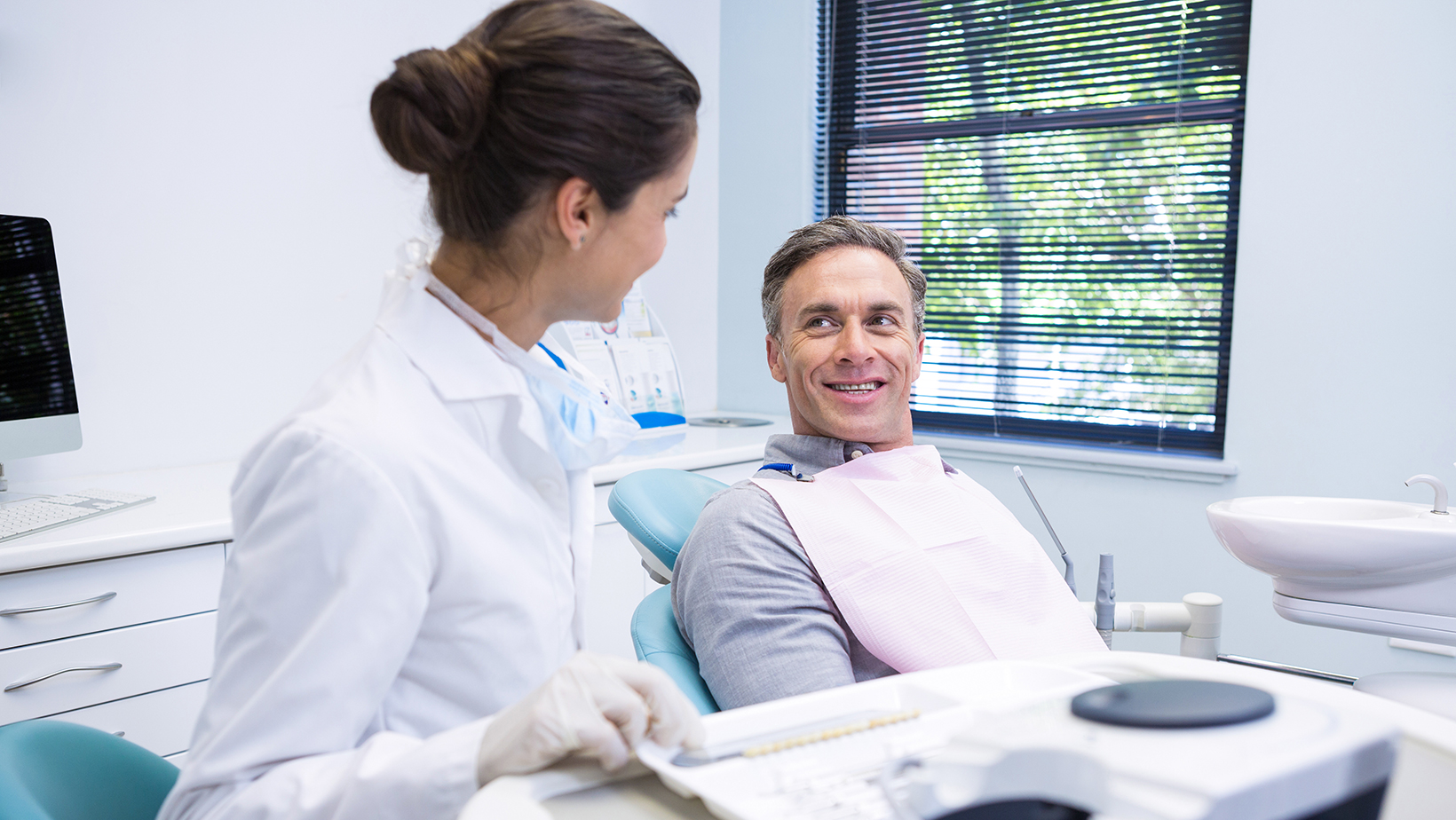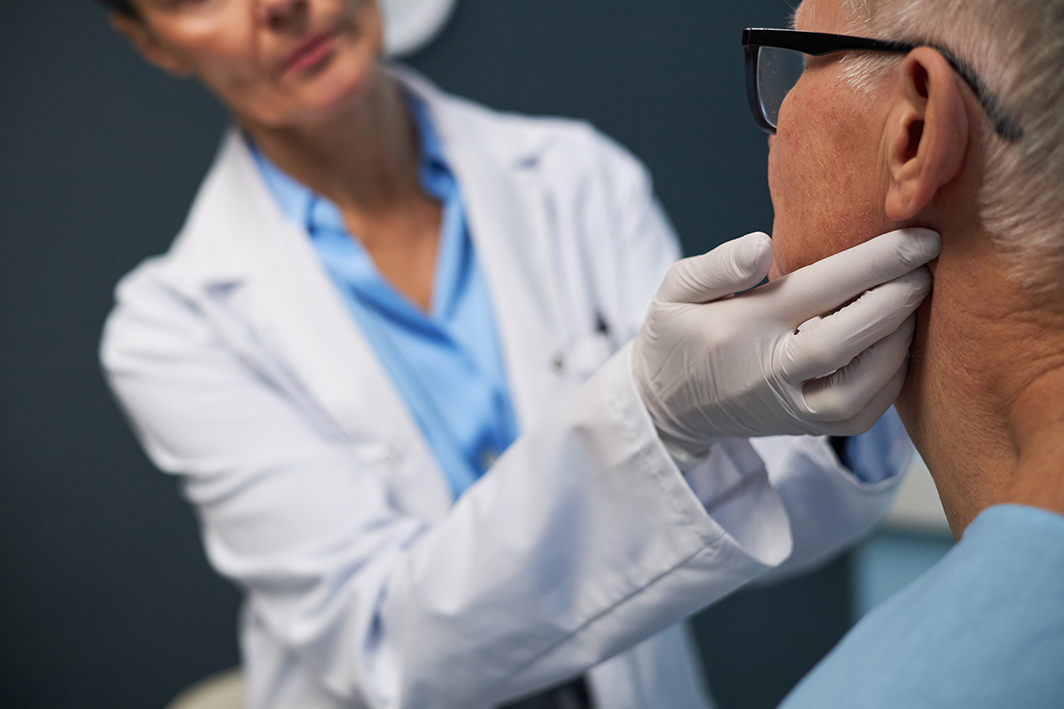An oral cancer diagnosis can be very scary. Fortunately, if the first signs of mouth cancer are caught early enough, it can be cured. We will discuss the best treatment options available, and why it’s important to have a dentist who is familiar with detecting cancer early.
First Signs of Mouth Cancer: Why Early Detection is Key
Many of us have had a fever blister on the lip, or a white patch inside the cheek. While those things usually go away within two or three weeks, persistent sores can be cause for concern. If lesions on the lips, tongue, lining of the cheeks, roof and floor of the mouth, tonsils, or throat have been present for more than three weeks, your dentist will likely order a biopsy to determine if it is cancer.
The first signs of mouth cancer include:
- Lip or mouth sores that bleed easily
- Rough or crusty patches on the tongue or lips, or inside of the mouth
- Lumps or thickness in the soft tissue of the mouth
- Chronic bad breath
- Pain when chewing, speaking, or moving the tongue or jaw
- Ear pain
- Unexplainable weight loss
When cancer is confirmed, it is given a “stage” between 0 and 4 to describe how advanced it is. Stage 0 means abnormal pre-cancerous cells are present but are contained in the lining of the mouth or throat. This is highly likely to be curable, as are Stages 1 and 2 in which cancer cells have not reached the lymph nodes.
Oral cancer in Stage 3 has spread to one or more lymph nodes but not to distant organs. Stage 4 cancer has spread (metastasized) to multiple lymph nodes and can eventually make its way to the neck, head, or other parts of the body. Once it has spread it is much more difficult to cure.
Is Oral Cancer Treatable?
When mouth cancer is detected early, more than 80% of patients diagnosed are able to be cured. A treatment team usually includes dental practitioners, oral surgeons, radiation specialists and chemotherapy specialists.
Typically, an oral cancer treatment regimen involves several steps:
Dental Work
Any teeth with deep cavities or periodontal problems may be removed first, because extracting them after radiation can affect the ability for tissue to heal, leading to exposure to the underlying bone. A dental cleaning will also be done to reduce bacteria in the mouth.
Surgery
All cancerous spots within the mouth are removed, along with surrounding tissue that could be harboring cancer cells. If the cancer has spread to lymph glands in the neck, those will be removed as well. Patients who have a large part of the tongue or jaw may need to have reconstructive surgery using skin or bone from another area of the body.
Radiation Therapy
Radiation works by targeting remaining cancer cells with powerful energy beams. While it may not be needed in very early cases, most practitioners recommend radiation after surgery as a preventive measure.
Chemotherapy
Chemotherapy is a drug that also kills cancer cells. It’s administered either intravenously or through a pill, so unlike radiation which focuses on one particular area of cancer, it affects the entire body. Chemotherapy is often used in combination with radiation, and is especially recommended when cancer has spread to other areas.
Immunotherapy
Immunotherapy is sometimes used to boost the patient’s immune system so it’s able to better fight cancer cells. It is often used in combination with radiation and/or chemotherapy.
Can Mouth Cancer Be Cured in Advanced Stages?
It may not be possible to cure oral cancer once it has spread to distant organs. The goal in advanced stages is to slow cancer’s growth and ease discomfort. A palliative care team will develop a plan that may include radiation or chemotherapy to shrink tumors, pain medications, and therapies to make swallowing and chewing more comfortable. They will also recommend counseling services to help the patient and family members cope.

Regular Dental Checkups and Self-Exams Can Help Prevent Oral Cancer
Bi-annual dental exams have an important purpose beyond cleaning teeth. Dentists also check the lips, mouth, and throat for the first signs of mouth cancer, and can act quickly to help formulate a treatment plan.
In addition to scheduling regular checkups, patients should perform a self-exam to identify early signs of cancer at home:
- Feel the outside and inside of the lips for sores or bumps.
- Tilt the head back and check the roof of the mouth for white or red patches.
- Shine a light in the back of the throat to look for sores or patches.
- Pull the cheeks out to view the lining of the cheeks and back gums.
- Pull the tongue out and check the top, bottom and sides of it.
- Push the tongue back to examine the floor of the mouth.
- Feel along the neck and under the lower jaw for lumps or enlarged lymph nodes.
If you find any signs of oral cancer, make an appointment to see your dentist right away. And if you have not scheduled a checkup with a dentist within the past six months, call now. You can find a listing of providers near you in our database.


